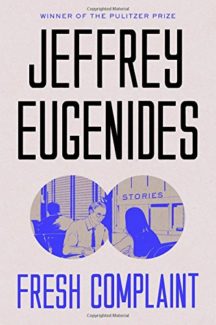 Hello Darkness, My Old Friend
Hello Darkness, My Old Friend
Author: Jeffrey Eugenides
During May, the famous month of the short story, I discovered that long-time favorite author Jeffrey Eugenides had published another work, Fresh Complaint. It was sitting there, gleaming with all the potential sadness and eloquent introspection on the human condition that characterizes Eugenides’ shattering prescience. It was also the library book club’s selection for that month. I pounced. Memories of Virgin Suicides and Middlesex, filling my mind, I dove in, despite the fact that I’m really more of a long fiction (i.e. novel) person. I like the completion, the sense of coming full circle, instead of the open-endedness that often characterizes short stories. Eugenides, with his hankering for generational sagas and deep dives into the darkest corners of the human psyche, definitely seems more like a novel – okay, an opus – sort of author. Still, doubts aside, I dove in, curious to see how the master of arm-breaking novels like Middlesex would navigate the short form.
Eugenides is different in the short form – more concise and more encouraging of readers to interpret the multiple layers of his characters as averse to revealing them through slow buildup. Everyone here though, is typical Eugenides in that depression, a miasma of sheer meaninglessness, hovers around them and even small interactions are complicated with layers of suicidal desires and dismal foreshadowing. It’s Eugenidies – expect nothing less. What is typical, not of the author, but of the form, is the abruptness and the lack of completion. Combined with Eugenidies’ choice of emotion over plot, many of the stories in Fresh Complaint are atmospheric but ultimately forgettable. Dissolute with unsympathetic characters and endings that go nowhere, leaving the pure verve of Eugenidies’ descriptive language to fade. Not to say that any of the stories are complete misses, but neither are they complete hits. Some are enjoyable, others vaguely disturbing, still more “just so” with an elegant writing style but no real soul.
For example, the story, “The Oracular Vulva,” proves especially, uncomfortably weird, as a sexologist studying intersex persons (yes, think Middlesex) finds himself succumbing to the cultural norms of a forest society where pedophilia is not just the norm, but an expectation. As a guest, it is rude of him to refuse the overtures of the eager young boys and as the character ruminates, audiences become steadily more horrified. What Eugenidies’ point is in this story, I’m not sure, but it leaves readers with a bad taste.
 Other stories are more palatable such as “Air Mail,” in which a young man journeying to island nations with friends is stricken with life threatening diarrhea. He somehow manages to orate the slow erosion of his insides and the near-hallucinations of dehydration in a surrealistic, transcending manner that captivates the reader with an odd sort of beauty even in the ugliness of undignified death. Here, Eugenidies’ unique writing style shines and we once again see his spark of greatness as it kindles into a brief, but burning, life.
Other stories are more palatable such as “Air Mail,” in which a young man journeying to island nations with friends is stricken with life threatening diarrhea. He somehow manages to orate the slow erosion of his insides and the near-hallucinations of dehydration in a surrealistic, transcending manner that captivates the reader with an odd sort of beauty even in the ugliness of undignified death. Here, Eugenidies’ unique writing style shines and we once again see his spark of greatness as it kindles into a brief, but burning, life.
“Baster” is an irreverently funny story that follows “Air Mail.” It introduces a thwarted would-be lover, his slutty best friend, and her pregnancy/insemination party. It’s weird and wacky and most certainly all Eugenidies with undertones of bitterness and loneliness saturated by irony and a you-so-saw-it-coming conclusion that is still a chuckle.
In “Early Music” a middle aged man laments the loss of his young dreams, meanwhile bankrupting his family with an expensive musical instrument that sits, splendid, in the middle of suburban squalor – leaking roofs, flaking grout, and all the trappings of middle class dissolution. The angst is elegantly portrayed, focusing on the breaking down of a relationship by the mundane necessities of daily life and practical needs over flamboyant desires. In the end, it’s all about the slow death of dreams.
 The last story, the collection’s namesake, “Fresh Complaint” is altogether something a little different, with a more definitive plot structure and a beginning, middle, and end. A young girl from India, haunted by her impending arranged marriage, will do anything to stop it. When she meets a desperate, seedy professor with a penchant for cheating, opportunity arises, but at what a cost to them both. It’s effectively a story of the lesser evil and a moral warning to those who are easily swayed by a pretty pair of eyes and a desire to feel young again.
The last story, the collection’s namesake, “Fresh Complaint” is altogether something a little different, with a more definitive plot structure and a beginning, middle, and end. A young girl from India, haunted by her impending arranged marriage, will do anything to stop it. When she meets a desperate, seedy professor with a penchant for cheating, opportunity arises, but at what a cost to them both. It’s effectively a story of the lesser evil and a moral warning to those who are easily swayed by a pretty pair of eyes and a desire to feel young again.
In the conclusion, Fresh Complaint, gathered from across Eugenides’ career, is enjoyable, at moments even deep, but ultimately not his best or most memorable work. Eugenidies’ strength lies in a realm not constricted by a word limit – a place where amorphous endings are replaced by the hard-hitting yet oddly dreamy realism of existential despair.
– Frances Carden
Follow my reviews on Twitter at: https://twitter.com/xombie_mistress
Follow my reviews on Facebook at: https://www.facebook.com/FrancesReviews/
[AMAZONPRODUCTS asin=”1250192722″]
- Book Vs Movie: The Shining - April 6, 2020
- Thankful For Great Cozy Mysteries - December 13, 2019
- Cozy Mysteries for a Perfect Fall - October 20, 2019


